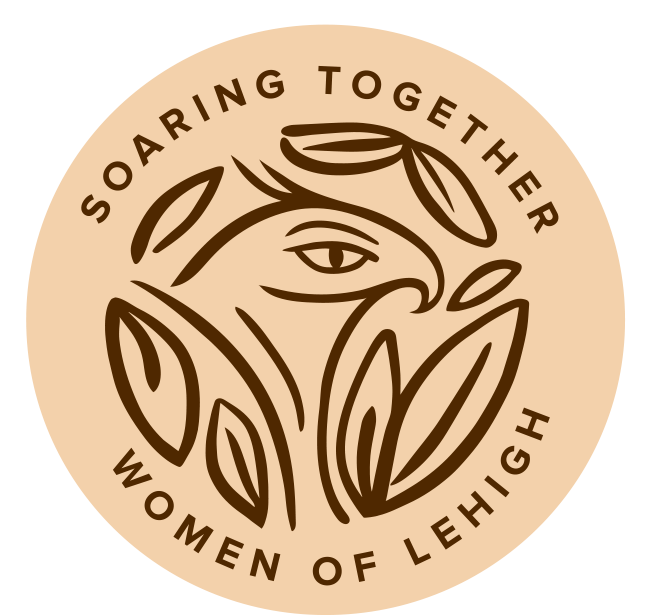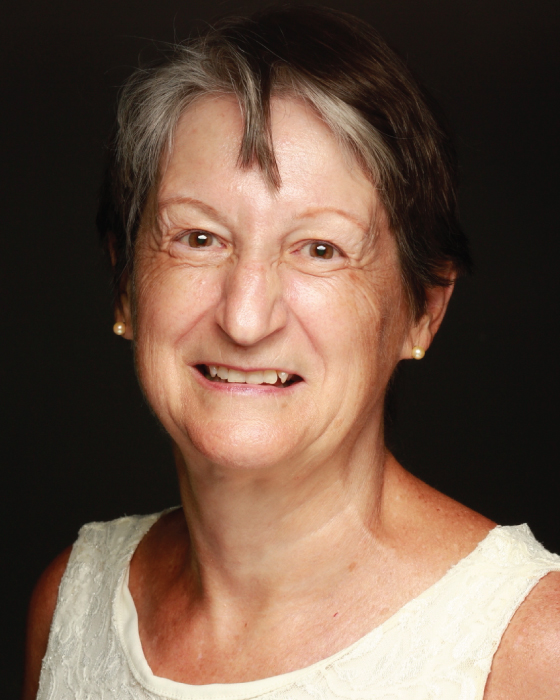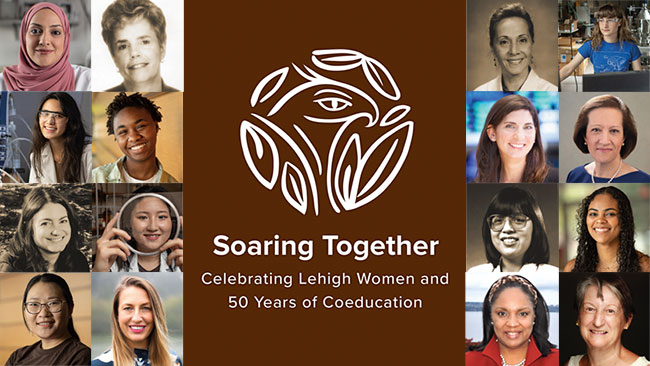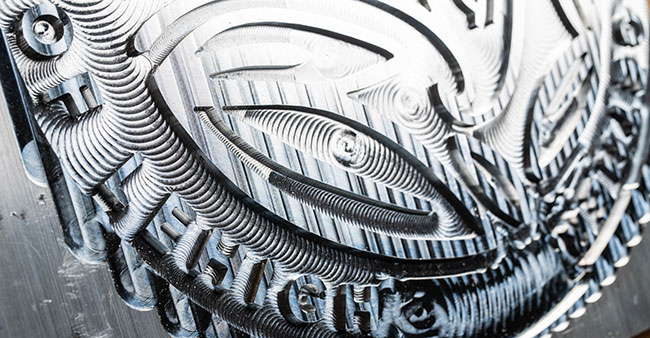
Emily Winn-Deen '74 holds a BS in chemistry from Lehigh. She is president of Rx Dx Advisors, a diagnostics and life sciences consulting company, where she focuses on assisting clients with bringing cutting edge molecular diagnostics to market. She is also senior vice-president, diagnostics, for Mercy BioAnalytics, a start-up company working to develop blood-based tests for the early detection of cancer. Here, she shares her reflections as a member of the university's first co-ed undergraduate class (and the first woman to graduate from Lehigh's chemistry program) and as a woman STEM professional.
 Reflections on Soaring Together: Emily Winn-Deen
Reflections on Soaring Together: Emily Winn-Deen
When I came to Lehigh in fall 1971 as part of the first class of women entering the university, I was not thinking so much about breaking barriers for women as I was looking for a solid education in my chosen major, chemistry. While I loved growing up in a university town (Princeton, NJ), when the time came, I wanted to “go away” for college. I looked for options similar in atmosphere to Princeton, with a strong science and engineering focus. Lehigh and all of the Ivy League schools were in the process of transitioning from all-male undergraduate programs to admitting women for the first time.
While my top choices were Lehigh and Cornell, I applied to Lehigh early decision, was quickly accepted, and became part of the first class of women to attend Lehigh (100 women, 3000 men).
I lived in the newly constructed Centennial II complex, in an all-female dorm (Carothers) with an awesome group of other adventurous women who supported one another. One advantage of being the only woman in most of my science and math classes was that the professors and other students quickly learned my name, simplifying my integration into Lehigh’s community. A few old-school men made some snide remarks about how they voted against admitting women, but most turned out to be just fine with having women at Lehigh.
There were a few early missteps by the university, like the formal invitation that arrived inviting all freshmen to a special welcoming ceremony to which “students were requested to wear jackets and ties.” The women from my dorm had a good laugh at this, borrowed jackets and ties for the occasion from some of the male students, and sat as a group in the front row. We made our point that some things at Lehigh were changing—without ever having to utter a word.
The science and engineering majors at Lehigh were quite demanding ,with lectures every morning and lab classes each afternoon. However, from 4-6 p.m. everyone was free from classes and able to participate in the many extracurricular activities Lehigh offered. Music (Women’s Chorus/Glee Club) and drama (Mustard and Cheese) gave balance to my science-heavy workload and provided a fun outlet for a couple hours each day. In my senior year, the Women’s Chorus and Glee Club spent spring break touring the US Virgin Islands, marking the first time Lehigh women had participated in one of these biannual choir tours. We stayed in homes of various hosts and sang several concerts that week in different venues, including an impromptu concert in the airport during a flight delay.
My high school advanced placement classes gave me sufficient college credit to effectively start Lehigh as a sophomore, allowing me to finish college in only three years as the first woman to graduate from Lehigh’s chemistry program. Four years after leaving Lehigh, I received a PhD in chemistry from Boston University and began my professional working career.
My time at Lehigh prepared me well for my professional career in the male-dominated science workforce. I learned that my fellow students, and later my co-workers, were all people first, independent of gender, who could bond over our love of the scientific problems we were solving or the choral music we sang together. Really the only time I experienced any overt gender bias during my career was just after the birth of my second child, when my boss took me aside and told me I was not going to be promoted because I already had too much on my plate with young children at home. While in retrospect he may have been right, it stung at the time to have it stated so clearly that my status as a mother hurt my chances for professional advancement.
Throughout my career, I have always worked hard, but also tried to maintain a reasonable work-life balance. I opted to work in corporate R&D, developing biochemistry assays for use in laboratory medicine and life sciences research, and for companies that did not expect anyone to work nights or weekends except on rare occasions where deadlines demanded it.
However, my most rewarding years were somewhat of a career detour, working four years at Celera Genomics to complete the goal of sequencing the human genome in a faster, more efficient way than the university-based, publicly funded project. Most of the company was focused on the “consensus” genome, meaning the 99.5 percent of the DNA sequence shared by all humans, while my small group was charged with looking at the 0.5 percent where humans differed from one another. What a reminder that while every person is certainly an individual, we also all share so much.
While I have many accomplishments in my professional career, this big science team project is the one that I am most proud to have been a part of. Working with this multi-disciplinary team of men and women, all focused together on one common, audacious goal was exhilarating!
Today, when anyone can work anytime from anywhere, I find I enjoy the flexibility of working from my home office and setting my own work hours. Despite thinking I should be retired by now, I still work over 40 hours a week, just not in the constraint of a 9-to-5 workday. I often have Zoom meetings at 7 a.m., and answer emails after dinner, but I also take a midday break to sit outside and read almost every day.
Looking back on the past 50 years since I entered Lehigh, my advice to all Lehigh students is to pursue a field of study that challenges and excites you to work hard each day, as well as an outside interest that brings you joy and balance in your life. Exactly what those choices are will be different for each person, so have the courage to pursue the choices that make you the best possible version of yourself. Only you know what those choices are.
Many things will change around you over your working career, so embrace those changes as your life unfolds. Never stop learning new things. Lehigh will give you the firm foundation on which to build a wonderful life, whatever that may turn out to be.
More about Emily S. Winn-Deen
Winn-Deen has over 40 years of experience in diagnostics and genomics product development, and is an inventor on 38 issued and 8 pending US patents.
Recent executive experience includes serving as chief strategy officer and advisor for Mesa Biotech, a start-up company focused on delivering simplified molecular diagnostic solutions for point-of-care applications, vice president of research services at AltheaDx, and vice president for diagnostics product development at Illumina. Previously she was vice president for both business development and genetics and oncology R&D at Cepheid and senior director of the genomics business area at Roche Molecular Systems.
Winn-Deen’s molecular experience also includes directing the high throughput genotyping laboratory at Celera Genomics, developing the Applied Biosystems cystic fibrosis assay, and directing diagnostics R&D at Oncor, Inc. Her earlier career included development of clinical chemistry reagents, urinalysis strips, and immunoassays for several Siemens Healthcare business units.
Winn-Deen has served as PI or co-PI on funded grants from the NIST Advanced Technology Program, the National Cancer Institute, and the US Department of Defense, and on grant review committees for the National Institute of Allergy and Infectious Disease and the National Cancer Institute.
She received the American Association for Clinical Chemistry (AACC) Northern California Section’s Harold Van Remortel Service Award, their Outstanding Contribution to Clinical Chemistry through Science and Technology Award (2006), and AACC’s Outstanding Speaker Award. Other awards include Behring Diagnostics’ Customer Acceptance Award and Behring Award, and Applera Corporation’s Inventor Award. In recognition of her career achievements, she was elected a Fellow in the National Academy of Clinical Biochemistry in 2000.
Professional volunteer activities include serving on the Health and Human Services Secretary’s Advisory Committee on Genetics, Health and Society (2003-2006), on the CDC’s Clinical Laboratory Improvement Advisory Committee (2007-2011), and as vice-chair of the Clinical Laboratory Standards Institute Expert Panel on Molecular Methods (2015-2018), where she was involved in writing consensus guidelines for clinical molecular testing. She has served on the editorial board of the Journal of Molecular Diagnostics since 2016.
For more about the Soaring Together celebration of 50 years of coeducation at Lehigh, including news items, blog entries, and more, please visit lehigh.edu/soaringtogether.
This Q&A is part of Resolve Magazine's Soaring Together series.


